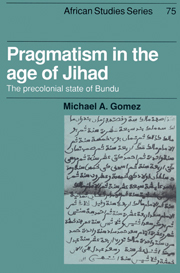Book contents
- Front matter
- Contents
- List of maps
- Acknowledgements
- List of abbreviations
- Notes on spelling
- 1 Introduction
- 2 Malik Sy and the origins of a pragmatic polity
- 3 Consolidation and expansion in the eighteenth century
- 4 External reforms and internal consequences: Futa Toro and Bundu
- 5 The reassertion of Sissibe integrity
- 6 Structure of the Bundunke almaamate
- 7 Struggle for the Upper Senegal Valley
- 8 Al-hajj Umar in Bundu
- 9 The age of Bokar Saada
- 10 Mamadu Lamine and the demise of Bundu
- 11 Conclusion
- Appendices
- Notes
- Bibliography
- Index
- Other Books in the Series
10 - Mamadu Lamine and the demise of Bundu
Published online by Cambridge University Press: 22 September 2009
- Front matter
- Contents
- List of maps
- Acknowledgements
- List of abbreviations
- Notes on spelling
- 1 Introduction
- 2 Malik Sy and the origins of a pragmatic polity
- 3 Consolidation and expansion in the eighteenth century
- 4 External reforms and internal consequences: Futa Toro and Bundu
- 5 The reassertion of Sissibe integrity
- 6 Structure of the Bundunke almaamate
- 7 Struggle for the Upper Senegal Valley
- 8 Al-hajj Umar in Bundu
- 9 The age of Bokar Saada
- 10 Mamadu Lamine and the demise of Bundu
- 11 Conclusion
- Appendices
- Notes
- Bibliography
- Index
- Other Books in the Series
Summary
Bundu in the second half of the nineteenth century is a study in pathos. From the Civil War of 1853–54, to the jihāds of al-ḥājj Umar, to the ravenous policies of Bokar Saada, the Bundunkobe endured crisis after crisis. Any hope for relief was quickly dashed with the “invasion” of the cleric Mamadu Lamine in the early part of 1886. The combined effect of these incessant wars was a dramatic decline in Bundu's population. In the late 1850s, during the wars of Umar, Faidherbe estimated Bundu's population to have been around 100,000. This is surely exaggerated; a more credible figure would have been about 15,000, given the period. By 1887, in the midst of Mamadu Lamine's campaign, estimates on the population range from 9,350 to 10,000. While the method of estimation is not clear, nor is it certain that the various estimators were working within the same parameters, the qualitative evidence is consistent with the implications of the quantitative efforts that Bundu's population declined significantly within a span of thirty-five years. As a result of Mamadu Lamine's jihād, Bundu ceased to be a power of any substance or importance.
Bokar Saada's death was a major turning point in the fortunes of the Bundunke people. The French had lost an ally, the Bundunkobe a tyrant. Umar Penda, Bokar Saada's brother, became Almaami. Around fifty years old, he had fought alongside Bokar Saada, but he was not as loyal to the French.
- Type
- Chapter
- Information
- Pragmatism in the Age of JihadThe Precolonial State of Bundu, pp. 152 - 174Publisher: Cambridge University PressPrint publication year: 1993



